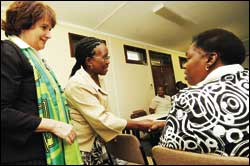Caring about palliative care
25 April 2006
Liz Gwyther, Sister Thandi Mashoa and Deputy Minister of Health Nozizwe Madlala-Routledge at the palliative care workshop.
Deputy Minister of Health Nozizwe Madlala-Routledge is becoming a bit of a regular at events hosted by UCT's Palliative Medicine Unit. In December last year, Madlala-Routledge - who has chronic health care as one of her portfolios and has expressed a special interest in palliative care - attended an international conference on the topic here at UCT. It was at the gathering that the deputy minister requested a front-row seat at one of the Palliative Medicine Unit's training sessions. Just a few weeks back, she finally got her chance. The occasion was a three-day workshop that forms part of the unit's postgraduate distance-learning programmes - the diploma and MPhil in palliative medicine. The workshop is one of the two face-to-face sessions held each year for those on the programmes. The "students" are qualified doctors from all over South Africa and the continent who, according to the unit's Liz Gwyther, have recognised that their training has not equipped them to deal with patients who either have life-threatening illness or who may be dying. "It seems that previous medical training focused exclusively on cure and, by default, neglected patients for whom cure is not possible," says Gwyther. Currently UCT is the only university in Africa that offers postgraduate palliative medicine training.
 This work is licensed under a Creative Commons Attribution-NoDerivatives 4.0 International License.
This work is licensed under a Creative Commons Attribution-NoDerivatives 4.0 International License.
Please view the republishing articles page for more information.










